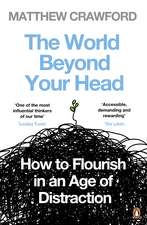The Optimism Bias
Autor Tali Sharoten Limba Engleză Paperback – 4 ian 2012
| Toate formatele și edițiile | Preț | Express |
|---|---|---|
| Paperback (2) | 52.87 lei 3-5 săpt. | +26.00 lei 7-13 zile |
| Little Brown Book Group – 4 ian 2012 | 52.87 lei 3-5 săpt. | +26.00 lei 7-13 zile |
| VINTAGE BOOKS – 31 mai 2012 | 97.97 lei 3-5 săpt. |
Preț: 52.87 lei
Preț vechi: 69.66 lei
-24% Nou
Puncte Express: 79
Preț estimativ în valută:
10.12€ • 10.56$ • 8.37£
10.12€ • 10.56$ • 8.37£
Carte disponibilă
Livrare economică 15-29 martie
Livrare express 01-07 martie pentru 35.99 lei
Preluare comenzi: 021 569.72.76
Specificații
ISBN-13: 9781780332635
ISBN-10: 1780332637
Pagini: 272
Dimensiuni: 126 x 196 x 30 mm
Greutate: 0.22 kg
Editura: Little Brown Book Group
ISBN-10: 1780332637
Pagini: 272
Dimensiuni: 126 x 196 x 30 mm
Greutate: 0.22 kg
Editura: Little Brown Book Group
Notă biografică
Tali Sharot’s research on optimism, memory, and emotion has been the subject of features in Newsweek, The Boston Globe, Time, The Wall Street Journal, New Scientist, and The Washington Post, as well as on the BBC. She has a Ph.D. in psychology and neuroscience from New York University and is currently a faculty member of the Department of Cognitive, Perceptual, and Brain Sciences at University College London. She lives in London.
Extras
Table of Contents
Prologue: A Glass Forever Half Full?
1. Which Way Is Up? Illusions of the Human Brain
2. Are Animals Stuck in Time? The Evolution of Prospection
3. Is Optimism a Self- Fulfi lling Prophecy? How the Mind Transforms Predictions into Reality
4. What Do Barack Obama and Shirley Temple Have in Common? When Private Optimism Meets Public Despair
5. Can You Predict What Will Make You Happy? The Unexpected Ingredient for Well- being
6. Crocuses Popping Up Through the Snow? When Things Go Wrong: Depression, Interpretation,
and Genes
7. Why Is Friday Better Than Sunday? The Value of Anticipation and the Cost of Dread
8. Why Do Things Seem Better After We Choose Them? The Mind’s Journey from Expectation to Choice and Back
9. Are Memories of 9/11 as Accurate as They Seem? How Emotion Changes Our Past
10. Why Is Being a Cancer Survivor Better Than Winning the Tour de France? How the Brain Turns Lead into Gold
11. A Dark Side to Optimism? From World War II to the Credit Crunch—Underestimating Risk Is Like Drinking Red Wine
Epilogue: A Beautiful Mademoiselle or a Sad Old Lady? From Prediction to Perception to Action
Acknowledgments
Notes
Index
From the Hardcover edition.
Prologue: A Glass Forever Half Full?
1. Which Way Is Up? Illusions of the Human Brain
2. Are Animals Stuck in Time? The Evolution of Prospection
3. Is Optimism a Self- Fulfi lling Prophecy? How the Mind Transforms Predictions into Reality
4. What Do Barack Obama and Shirley Temple Have in Common? When Private Optimism Meets Public Despair
5. Can You Predict What Will Make You Happy? The Unexpected Ingredient for Well- being
6. Crocuses Popping Up Through the Snow? When Things Go Wrong: Depression, Interpretation,
and Genes
7. Why Is Friday Better Than Sunday? The Value of Anticipation and the Cost of Dread
8. Why Do Things Seem Better After We Choose Them? The Mind’s Journey from Expectation to Choice and Back
9. Are Memories of 9/11 as Accurate as They Seem? How Emotion Changes Our Past
10. Why Is Being a Cancer Survivor Better Than Winning the Tour de France? How the Brain Turns Lead into Gold
11. A Dark Side to Optimism? From World War II to the Credit Crunch—Underestimating Risk Is Like Drinking Red Wine
Epilogue: A Beautiful Mademoiselle or a Sad Old Lady? From Prediction to Perception to Action
Acknowledgments
Notes
Index
From the Hardcover edition.
Recenzii
“Fascinating. . . . Even if you’re a dedicated cynic, you might be surprised to learn that your brain is wearing rose-colored glasses, whether you like it or not.”
—NPR
“What a treat. A charming, engaging and accessible book written by a scientist who knows how to tell a story.”
—Richard Thaler, author of Nudge
“An insightful, Oliver Sacks-y first book.”
—The Village Voice
“Very enjoyable, highly original and packed with eye-opening insight, this is a beautifully written book that really brings psychology alive.”
—Simon Baron-Cohen, author of The Science of Evil
“Offers evolutionary, neurological, and even slightly philosophical reasons for optimism. . . . A book I’d suggest to anyone.”
—Terry Waghorn, Forbes
“If you read her story, you’ll get a better grip on how we function in it. I’m optimistic about that.”
—Richard Stengel, Time
“Once I started reading The Optimism Bias, I could not put it down.”
—Louisa Jewell, Positive Psychology News Daily
“An intelligently written look into why most people take an optimistic view of life. . . . [A] fascinating trip into why we prefer to remain hopeful about our future and ourselves.”
—New York Journal of Books
“With rare talent Sharot takes us on an unforgettable tour of the hopes, traps and tricks of our brains. . . . A must-read.”
—David Eagleman, author of Incognito
“A fascinating yet accessible exploration of how and why our brains construct a positive outlook on life.”
—BrainPickings.org
“Lively, conversational. . . . A well-told, heartening report from neuroscience’s front lines.”
—Kirkus Reviews
“Most readers will turn to the last page not only buoyed by hope but also aware of the sources and benefits of that hope.”
—Booklist
“Fascinating and fun to read. . . . Provides lucid accounts of [Sharot’s] often ingenious experiments.”
—BBC Focus Magazine
—NPR
“What a treat. A charming, engaging and accessible book written by a scientist who knows how to tell a story.”
—Richard Thaler, author of Nudge
“An insightful, Oliver Sacks-y first book.”
—The Village Voice
“Very enjoyable, highly original and packed with eye-opening insight, this is a beautifully written book that really brings psychology alive.”
—Simon Baron-Cohen, author of The Science of Evil
“Offers evolutionary, neurological, and even slightly philosophical reasons for optimism. . . . A book I’d suggest to anyone.”
—Terry Waghorn, Forbes
“If you read her story, you’ll get a better grip on how we function in it. I’m optimistic about that.”
—Richard Stengel, Time
“Once I started reading The Optimism Bias, I could not put it down.”
—Louisa Jewell, Positive Psychology News Daily
“An intelligently written look into why most people take an optimistic view of life. . . . [A] fascinating trip into why we prefer to remain hopeful about our future and ourselves.”
—New York Journal of Books
“With rare talent Sharot takes us on an unforgettable tour of the hopes, traps and tricks of our brains. . . . A must-read.”
—David Eagleman, author of Incognito
“A fascinating yet accessible exploration of how and why our brains construct a positive outlook on life.”
—BrainPickings.org
“Lively, conversational. . . . A well-told, heartening report from neuroscience’s front lines.”
—Kirkus Reviews
“Most readers will turn to the last page not only buoyed by hope but also aware of the sources and benefits of that hope.”
—Booklist
“Fascinating and fun to read. . . . Provides lucid accounts of [Sharot’s] often ingenious experiments.”
—BBC Focus Magazine














